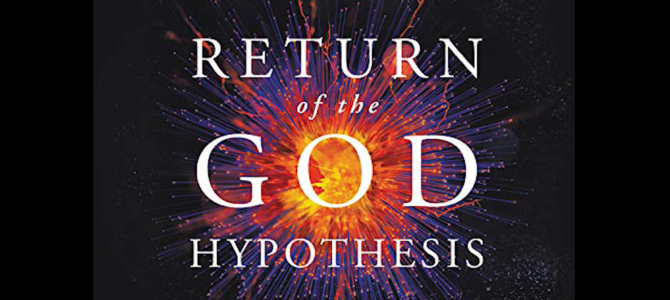
When the emperor Napoleon asked the great French mathematician Pierre-Simon Laplace why the Creator was never mentioned in his manuscript “A Treatise of Celestial Mechanics,” Laplace is alleged to have replied, “I had no need of that hypothesis.”
Philosopher of science Stephen Meyer’s new book, “Return of the God Hypothesis: Three Scientific Discoveries That Reveal the Mind Behind the Universe,” documents the history of the fall of the God hypothesis in science during the 19th century and the first half of the 20th century. But the hypothesis is back, Meyer explains, detailing three scientific discoveries of the last 100 years that are fueling its “return.”
The three are: 1) the discovery that the secret of life is the information contained in living things, 2) the discovery that the laws and constants of physics in our universe are extremely “fine-tuned” for life and 3) the discovery that the universe had a beginning.
While no one today claims it is needed to explain celestial mechanics, the “God hypothesis” was never truly replaced by plausible explanations for the origin and evolution of life. It was simply banished from science by arbitrary fiat, fueled by the successes of science in other areas.
Charles Darwin’s extremely implausible explanation for the origin of species, which becomes more implausible with every new biological and biochemical discovery, remains popular in the scientific world today only because — no matter how implausible and how inconsistent with the evidence — it must be true because it is the only alternative anyone can imagine to the “unscientific” theory of intelligent design.
Meyer, who is director of the Center for Science and Culture at the Discovery Institute, argues that the presence of vast amounts of “digital information” in the DNA of living things point to a designing mind — as it does everywhere information is found. Not only that, he says the sudden appearance of new information, especially about 500 million years ago at the Cambrian explosion (the main topic of his previous bestseller, “Darwin’s Doubt“), is even harder to explain without design.
As Meyer documents, today a growing minority of scientists are finally recognizing that there can never be a plausible explanation for the origin and evolution of life in terms of entirely unintelligent forces, that the information found in living things could not have arisen without design.
Furthermore, as also documented in great detail in Meyer’s book, in the last century it was discovered that even these “unintelligent” forces of physics are finely tuned for life: the values of most of the constants of physics (the gravitational constant, speed of light, Planck’s constant, the charge and mass of the electron, and on and on) had to be almost exactly what they are or no conceivable form of life could have arisen in our universe. Atheists can only speculate that there must be many universes with random values for these constants, and we are here because our universe is one of the rare universes where the conditions are just right for us to be here.
The third scientific discovery Meyer highlights that has resulted in a resurgence of the God hypothesis in science is the discovery in the last century that the universe is not eternal. Instead, scientists now claim it began suddenly about 14 billion years ago with a “big bang.” That time, space, matter, and energy could be created out of nothingness clearly points to a cause external to our universe.
The three discoveries highlighted by Meyer are well known to most scientists, but if you rely on the corporate media for your science news you may never have been exposed to any serious discussion of their implications. This is your chance to hear the other side: it is a long book (576 pages) but a fairly easy read, mostly about the history of science before and after these three discoveries, and how different scientists have reacted to them.
Although the majority of scientists still insist that it must be possible to explain everything in science without the God hypothesis, it is becoming harder and harder to dismiss intelligent design as unscientific and its supporters as ignorant, as a glance at the endorsers of Meyer’s book will make clear. Among the many top scientists who have endorsed the book is Nobel Prize-winner Brian Josephson, a physicist at Cambridge University, who says: “This book makes it clear that far from being an unscientific claim, intelligent design is valid science.”









